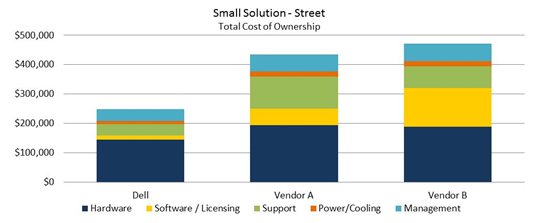The new Dell Storage SC4020 all-in-one array, which began shipping worldwide late last month, is built with one thing in mind – to bring the tremendous capabilities of the Dell Compellent SC8000 down to a mid-market price-point, and in doing so deliver a really exciting value proposition to our customers.
We knew SC4020 would deliver awesome TCO, so we asked the Enterprise Strategy Group (ESG) take a close look at the product and compare it to some of the top array competitors in the market. And it kicked ***!
In its study, ESG analyzed the TCO over eight years for two customers at the small and large ends of the “medium-sized business” segment. The smaller company was modeled initially requiring approximately 20TB of capacity, whereas the larger company had an initial requirement of approximately 24TB. The capacity and performance needs for each model started lower and gradually increased over time. The final primary site storage capacity at the end of the eight-year analysis period was roughly 40TB for the small configuration and around 110TB and for the large configuration.
The small company began with a mix of SAS and NL-SAS drives and added the performance advantage of SSDs in Year 4, while the large company model began with a mix of SSD and NL-SAS drives in Year 1 and added SSD, SAS, and NL-SAS spindles as the performance and capacity requirements dictated.
At the end, ESG found that SC4020’s TCO is 43% to 54% lower than its competitors. They attributed the difference to a combination of innovative technologies (e.g., data progression, tiering within flash, better thin provisioning) and equally innovative business models (e.g., perpetual licensing, and future-proof support for new technologies).
As you might expect, Dell delivers the SC4020 with competitive pricing, but more importantly, the ongoing management and operational costs were much lower. By providing a simpler way to manage, maintain, and upgrade a continuously growing infrastructure, SC4020 can save organizations hundreds of thousands of dollars in operational costs over a system’s lifetime. When you add in perpetual licensing and the ability to federate and grow storage systems without forklift upgrades, organizations can rest easy knowing that their investment is protected against unforeseen growing pains in the future.
Speaking of growing pains, who likes the destructive upgrade paths our competitors provide? ESG did the TCO study before this was public knowledge. Imagine how much better our TCO would be now. [:)]
 |
 |
Figure 1: Total Cost of Ownership for SC4020 and two leading competitors over 8-year period
Summary of ESG’s findings:
- In the small storage solution, Dell ($248,292) costs 43% and 47% less than nearly identical offerings from Vendor A ($434,490) and Vendor B ($471,599).
- In the large storage solution, Dell ($529,612) costs 54% and 51% less than nearly identical offerings from Vendor A ($1,149,702) and Vendor B ($1,083,711).
- The innovative design of SC4020 coupled with SLC/MLC flash tiering and data progression resulted in hardware costs that were 23% to 31% lower than the competing vendors.
- The management costs associated with Vendor A and Vendor B can be up to 40% higher than with Dell SC Series. This includes the cost of migrating old data, system forklift upgrades, and manpower.
- With lower hardware and software costs, Dell SC4020 also provides full Copilot support at a cost that is significantly lower (up to 76% lower) than those of both competing vendors.
- Software and licensing costs are significantly lower on the SC4020 (between 3.9 times and 9.2 times lower than the other vendors). The amazingly low software cost of the SC4020 included all of the SC Series enterprise-class software (including replication) and licensing for up to 48 drives regardless of drive capacity or type.
The complete ESG TCO study is available here.
